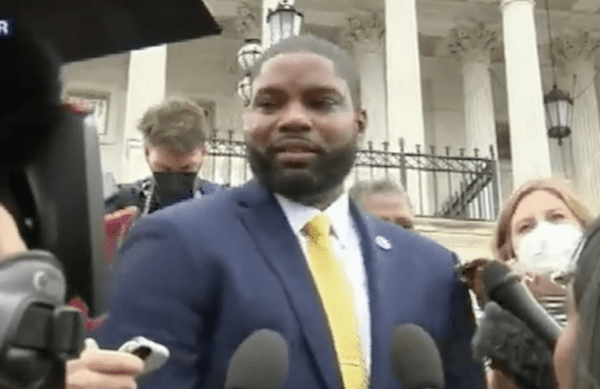In an urgent update from Capitol Hill, U.S. Rep. Byron Donalds (R-FL) delivers a categorical, facts-led critique on the perceived politicization of the federal judiciary, following the lenient sentencing of Rep. Jamaal Bowman (D-NY) for a misdemeanor. Last month, the Cannon Building, a bastion of American democracy, was evacuated mid-proceeding due to a fire alarm pulled by Bowman. An act which has yielded merely a metaphorical slap on his wrist – a fine of a thousand dollars, a three-month probation period, and the simple task of penning an apology.
.@ByronDonalds laughs at Rep. Jamaal Bowman's slap on the wrist for intentionally and unlawfully pulling the fire alarm.
"What, are we in seventh grade… And my colleague has to write a letter?”
READ MORE: https://t.co/0BWanRZimG#Flpol #Flapol pic.twitter.com/rLzi7uR2CB
— The Floridian (@Floridianpress) October 27, 2023
Bowman was captured on surveillance footage, tampering with emergency signs before pulling the fire alarm that precipitated a mass evacuation during a vote. Given the severity of the circumstances, the triviality of the penalty has been widely condemned, especially given the context of the disproportionality in sentences imposed upon non-violent January 6th protesters for “obstructing an official proceeding,” many of whom were handed multi-year prison sentences despite their clean records.
Donalds, the Florida lawmaker, capitalized on this evident disparity to draw attention to the shifting scales of justice. A comparison that sparked controversy among the press, with some accusing him of drawing false equivalencies. Resolute in his stance, Donalds countered: “We were in the middle of a vote series. An official proceeding of business is an official proceeding of business.”
In a counterplay, Donalds then focused on interrogation of the objectivity of the newly-elected House Speaker Mike Johnson (R-LA) in relation to his stimulus of the 2020 electoral certification’s objection. This issue was met deftly with an equivalence drawn to Hakeem and former Speaker of the House, Nancy Pelosi, both of whom objected to the 2016 elections.
Furthermore, Donalds lambasted the notion that elected officials’ worthiness is to be assessed by anyone other than their electors. He spotlighted the gross partisanship infesting the justice system, criticizing the judiciaries for wielding justice in a repugnant, cherry-picking manner, rather than adhering to the principle of the rule of law.
In this breaking report, Donalds exemplifies the voice of dissent about the horrors of political bias creeping into the hallowed halls of justice, jeopardizing its fairness, and painting a shameful color of partisanship over the black robes of impartiality. The tale of two cases – Bowman and the January 6th protesters – exemplifies such disparity, raising critical questions about the perceived misbalance in the scales of American justice.
In summary, this incident underscores the fact that accountability is not selective, it ought to be universal, impartial, and irrespective of political affiliation. The foundational essence of justice should be its blindfolded abundance, meted out equally. The words of Rep. Byron Donalds lay bare the current state of the federal justice system highlighting the need for impartiality, calling for a review of the current practices. “Justice being blind” should not be an old adage but a fundamental principle guiding the highest echelons of the American judiciary. The role of the federal justice system should always prioritize the sanctity of the rule of law over partisan biases, ensuring that the scales of justice swing unbiased, upholding the integrity of our democracy.



